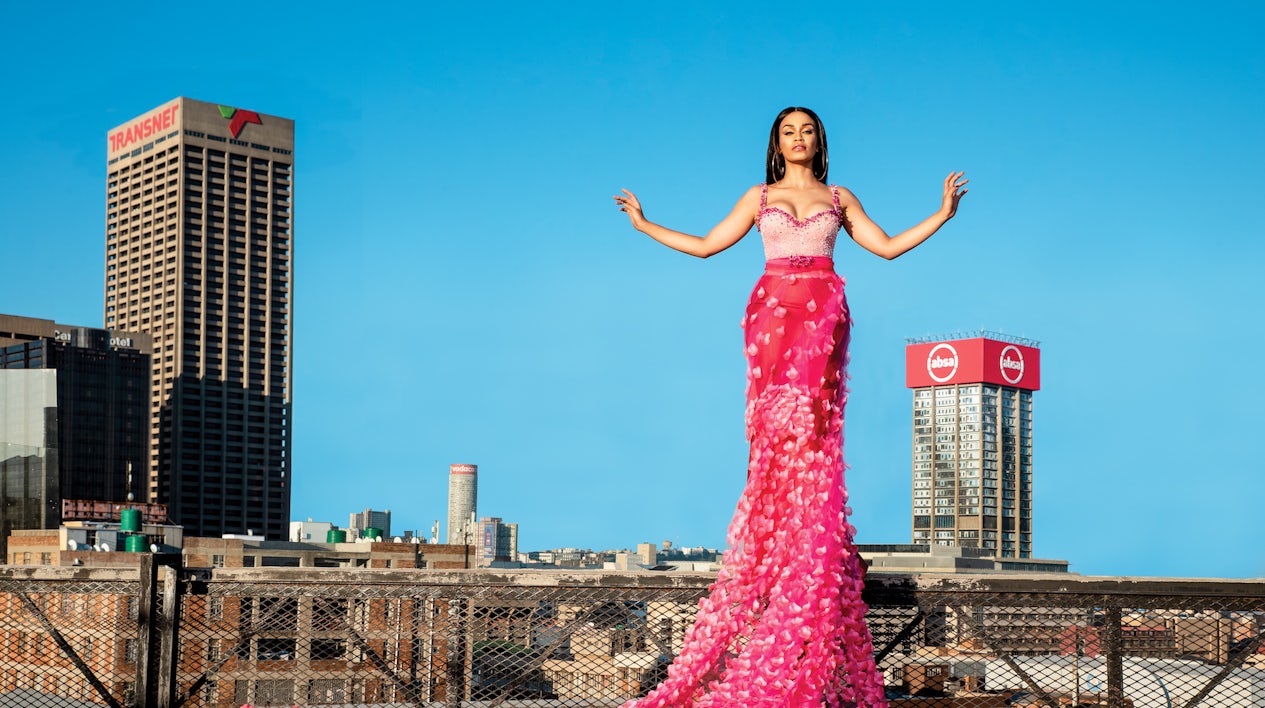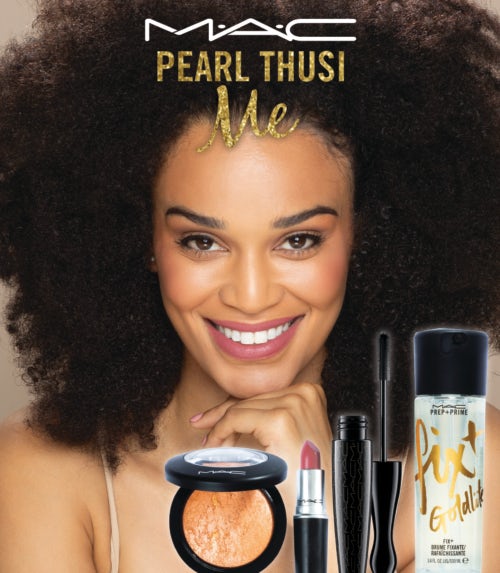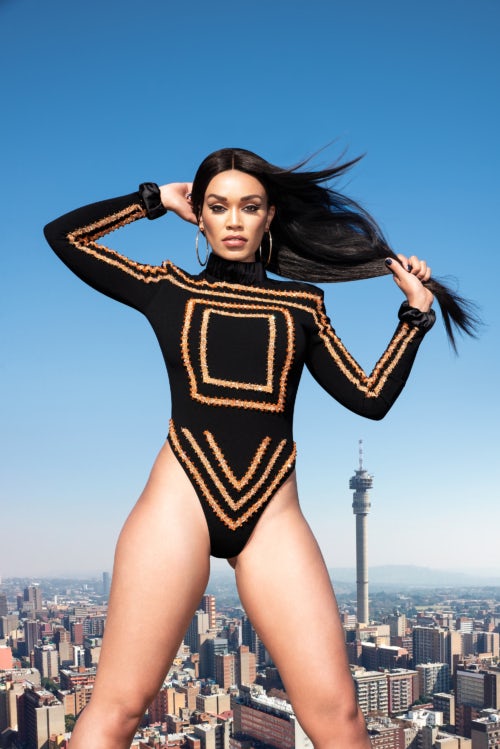Become a BoFProfessional

The Power of African Brand Ambassadors
Celebrity marketing has fallen out of favour during the pandemic. But when the strategy makes a comeback global brands need to act fast to tap more African influencers to access high-growth markets like Nigeria, Kenya and South Africa.
NEW YORK, United States — On the cover of a recent issue of the South African edition of Cosmopolitan, actress Pearl Thusi stands tall with the Johannesburg skyline behind her in a black and gold bodysuit by South African designer Gert-Johan Coetzee.
The March issue was the magazine’s first Netflix issue, meaning its pages were dedicated to highlighting the global streaming platform’s presence on the African continent. Thusi, 31, was the perfect cover star.
Before Netflix, Thusi was already an internationally recognised actress. Between 2016 and 2017, she starred in the hit US television show, Quantico, alongside Priyanka Chopra-Jonas. And in 2018, she was cast as the lead in Africa’s first-ever Netflix Original series, Queen Sono, which was released in February of this year and was recently renewed for a second season.
With over three million Instagram followers and a budding international career, Thusi’s sprawling fan base makes her one of the most bankable personalities on the continent. Clearly, it was only a matter of time before a savvy global brand saw the potential value of her influence.
In February 2020, MAC cosmetics launched a collection called MAC X Pearl, featuring Thusi as the face. According to a spokesperson for the upmarket cosmetics brand, the limited-edition collection featured a selection of classic MAC products curated by the actress herself. It also marked the first time the global brand had ever partnered with a South African public figure for a product collaboration.

Campaign for MAC featuring Pearl Thusi | Source: Courtesy
“MAC’s collaboration with South African pop-culture icon Pearl Thusi was a natural choice,” said Kerry Hochfelden, brand manager of MAC Cosmetics South Africa. Not only does the actress embody the brand’s DNA, she explained, but crucially she offers local relevance — something that affluent consumers on the African continent increasingly demand.
The success of Queen Sono and Netflix’s steady entrance into the continent has been met with great fanfare and over the last two years Netflix has set its sights on breaking ground in the South African, Kenyan, and Nigerian film industries.
If the coronavirus pandemic had not interrupted most brands’ plans on the continent, the timing would have been ideal for more of them to start casting African celebrities and influencers. Nevertheless market experts believe that once recovery begins, brands will need to seriously consider the strategy.
Several famous faces have laid the groundwork. Lupita Nyong’o and other African members of the Black Panther cast reaffirmed the global appeal of actors from the continent. But many of their peers in other high-profile film productions are perfectly suited for ad campaigns and brand ambassador roles that resonate with fashion, beauty and luxury consumers across the continent.
Elsewhere, luxury brands have localised their celebrity marketing strategies by tapping local actors, musicians, entertainers and influencers. While this has been a popular strategy in China and in markets across the Middle East and Latin America, few brands have gone down this route for African markets despite the fact that celebrity marketing is a valuable business lever to pull.
With an average annual growth of around 5.6 percent in the first half of the 2010s, Africa’s luxury retail sector has surpassed expectations. Analysts in a Bloomberg Professional briefing predicted that the regional market would reach $5.2 billion by 2019, but according to a 2019 New Wealth Report by AfrAsia Bank, the sector already generated $6.1 billion in revenue by 2018.
At the start of this year, projections for the continent’s continued growth seemed promising but the public health emergency that is Covid-19 will negatively impact African economies. In terms of the human tragedy, there are already more than 85,000 confirmed cases of the coronavirus and close to 3,000 deaths on the continent. Meanwhile, the World Bank’s April Africa’s Pulse report found that the virus is likely to drive Sub-Saharan Africa into its first recession in 25 years, with growth potentially falling as low as negative 5.1 percent in 2020.
But with some businesses already planning ahead for 2021 and beyond, the continent’s luxury market could still present an opportunity if it were not so challenging for brands to access affluent consumers there.
With comparatively few standalone luxury stores on the continent, an underdeveloped fashion media landscape and e-commerce platforms facing logistical hurdles, affluent Africans have tended to shop for luxury goods in Europe, Dubai and the US — which means that most global luxury brands have so far failed to establish direct marketing channels with consumers on the continent.
The result — according to several luxury industry leaders working on the continent — is that brands have underinvested in African markets and, when they do, their marketing strategies are often old-fashioned, lackluster or inconsistent. Celebrity marketing is an important piece in the marketing mix for brands to capture the continent’s growth potential, they contend, especially in the context of the current coronavirus crisis which is characterised by travel restrictions and lockdowns.
Why then have so few luxury brands taken advantage of the opportunity so far?
“I think a lot of brands struggle with that from a business standpoint — what’s the best way to enter an unknown market or one that you see has potential but you’re not sure about how to gain success?” said Bozoma Saint John, chief marketing officer at talent agency William Morris Endeavor which is headquartered in Beverly Hills and has offices around the world representing some of the biggest artists in global entertainment.
Saint John, who was born in the US to Ghanaian parents, said the key strategy for luxury brands looking to enter the continent is to make it more than just a pitstop. “You must spend the time understanding the culture and the people before entering the market,” she continued.
Star Power and High Net Worth Individuals
Nollywood, as the Nigerian film industry is popularly known, is often ranked as the second-largest film industry in the world in terms of film output, following India’s Bollywood. According to a 2017 report by PricewaterhouseCoopers, Nollywood contributed 239 billion naira to the country’s GDP in 2016 and is expected to reach $1 billion in export revenue by 2020. There is a business model waiting to be harnessed matchmaking brands with Nollywood stars that has already been proven long ago by the mutually beneficial relationship that exists between fashion brands and Hollywood stars.
There is a business model waiting to be harnessed matchmaking brands with Nollywood stars.
Throughout the continent, entertainment continues to serve as a connector, giving global brands a path of entry. In Nigeria, actresses like Genevieve Nnaji and Adesua Etomi and directors and producers like Kemi Adetiba and Mo Abudu have already found themselves bridging the gap between Nollywood and the wider world.
Nnaji’s film, Lionheart was reportedly acquired by Netflix for over $3 million, while Adesua’s starring role in the blockbuster The Wedding Party, which was directed and produced by Adetiba and Abudu, respectively, landed her on the cover of the April 2019 issue of American Vogue alongside one of India’s highest-paid actresses, Deepika Padukone and Hollywood star, Scarlett Johansson.
In music, Kenyan artists like Sauti Sol and Nigeria’s Burna Boy have garnered fame in both their home countries and internationally. In 2018, Nike tapped Nigerian artist Wizkid to launch a limited edition jersey, which sold out in ten minutes on the site. The sports brand noted that “to label Wizkid simply as a Nigerian pop-star contradicts his global influence.” With over ten million followers on Instagram alone and a history of chart-topping records, Wizkid’s star power proved to be a successful fit for a partnership with Nike.
“We’re all kind of tuned into that star quality that’s out there, and that’s why brands look to pop culture to create partnerships,” said Stacy Jones, chief executive of Hollywood Branded, a celebrity and social media marketing agency based in California.
But the kind of star quality that fashion and luxury brands need to serve as a successful marketing vehicle isn’t limited to actors and musicians. According to Jones, an influencer poised to represent a brand is virtually anyone who connects with the brand’s audience — whatever their background.
“It’s someone who is localised to that community who is respected and who is seen as a persona. That’s a true influencer.”
For luxury brands looking to break into the Nigerian market, Ijeoma Balogun, founder and chief executive of Lagos-based Redrick PR notes that high net worth customers in Nigeria respond to more than just a famous face. Oftentimes, celebrities like music artist Tiwa Savage or Nigerian media personality Toke Makinwa with millions of followers can be considered more mass market.
“A large number of their followers are part of an aspirational audience,” said Balogon. “This includes people who are looking to consume luxury in the future or who are considered entry level luxury consumers.”
For people who are repeat luxury consumers, Balogun credits peer-to-peer influence as a more effective marketing strategy and potential ambassadors from fields outside the normal entertainment realm such as famed Nigerian author Chimamanda Ngozi Adichie whose feminist slogan adorned Dior T-shirts for Maria Grazia Chiuri‘s first collection or members of high society working in the creative industries.
“They appeal to the high net worth audience because they are high net worth individuals [themselves].”
Localisation Sparks Interest
As interest in Africa’s entertainment sector grows beyond the continent’s borders, so does the opportunity for global luxury brands to grow their presence on the continent. One obvious way for brands to capitalise on the opportunity is to create more local content on social media with recognisable faces.

Cosmopolitan South Africa fashion editorial featuring Pearl Thusi | Photo: Legae Sehlako
Holly Meadows, who was the editor-in-chief of Cosmopolitan South Africa before its publisher announced that the title would be closing due to challenges presented by Covid-19, implores global brands to be more intentional about connecting with African consumers by creating campaigns that speak directly to their interests and experiences.
“We see huge traffic spikes when international brands are linked with a local face,” Meadows said, pointing to influencers like Bonang Matheba who served as the first-ever South African face of Revlon. “It gets people buying into a brand if they see the brand recognising local [South] African talent… using local faces, local photographers and recognising local talent.”
Several of the most popular Africa celebrities on Instagram collectively have over 50 million followers, with artists making as much $70,000 for a post according to a 2019 Instagram rich list compiled by Hopper HQ, a UK based Instagram scheduling tool company. Other African artists on the list, like Tiwa Savage and Wizkid reportedly make close to $50,000 per post, which shows that they are already profitable marketing vehicles.
“Africa Is Not a Country”
Local content doesn’t always have to revolve around a famous face or an influencer with a large following. Brands have also seen success by speaking directly to the communities they are interested in targeting through other means.
To celebrate Black History Month in February of this year, Nike hosted a basketball game in New York between Nigerians and Ghanaians living in the diaspora. Music artist Jidenna played on the Nigerian team donning a customised white and green Nike jersey, while Abdul Karim Abdullah, founder of the popular Ghanaian festival Afrochella represented his country in a custom black and white Nike jersey.
In addition showcasing their sportsmanship, the teams settled another highly contested score as both countries battled over who was known for having the best jollof rice, a West African delicacy served in over ten countries on the continent. The ripple effect of the offline event on social platforms earned Nike significant media value.
For TJ Adeshola, head of US sports partnerships at Twitter, the event was a success for many reasons, but what truly made it special was the attention to cultural nuances.
“It was for us and by us,” said Adeshola. “This doesn’t happen if you don’t have one of us at the table creating that experience. It’s about understanding the complexity of speaking to our rich culture.”
But for marketing to be effective, it also needs to be followed through with access to product. Meadows asks brands not to “underestimate the African market” noting that brands can be too selective about the products from their collections available on the continent and, as a result, leave African shoppers with the shorter end of the stick.
According to a 2015 report by McKinsey & Company, fifty-three percent of income earners on the continent are between 16 and 34 years old and are more willing to try and purchase new products. This youthful nature buoys Meadows’ point that luxury’s power a symbol of status and social success in Africa will help drive growth into the next decade.
More broadly, she notes that there have been many times luxury brands have gotten it wrong when it comes to marketing in Africa and it’s often a result of not knowing enough about a particular country’s culture or doing their homework. “We’ve seen this happen time and time again,” Meadows said.
According to Saint John, this comes down to the biggest mistake luxury brands continue to make when creating marketing strategies for the continent.
“Africa is not a country,” she said. “It’s a lot of different types of people with thousands of different cultures and nuances. So there isn’t just one strategy that will be appropriate for [all of] Africa.”